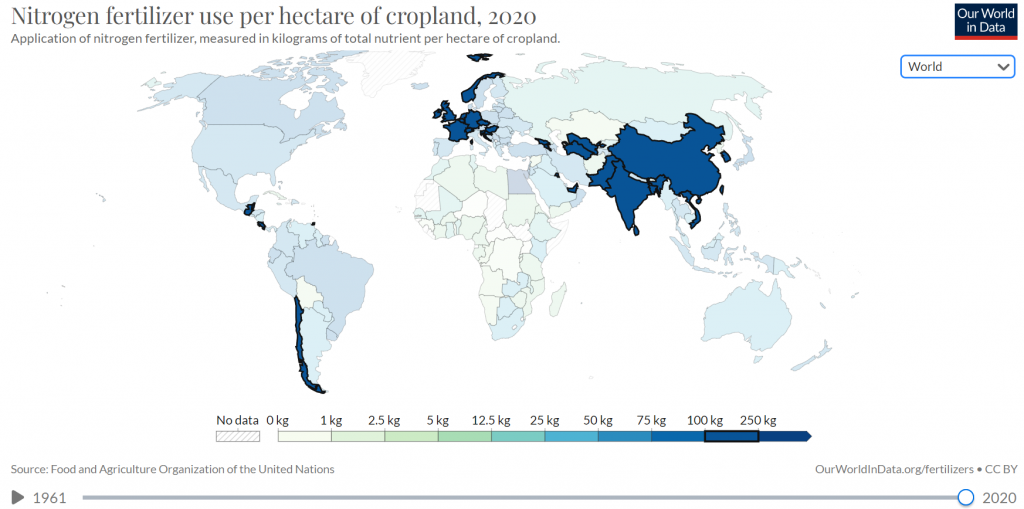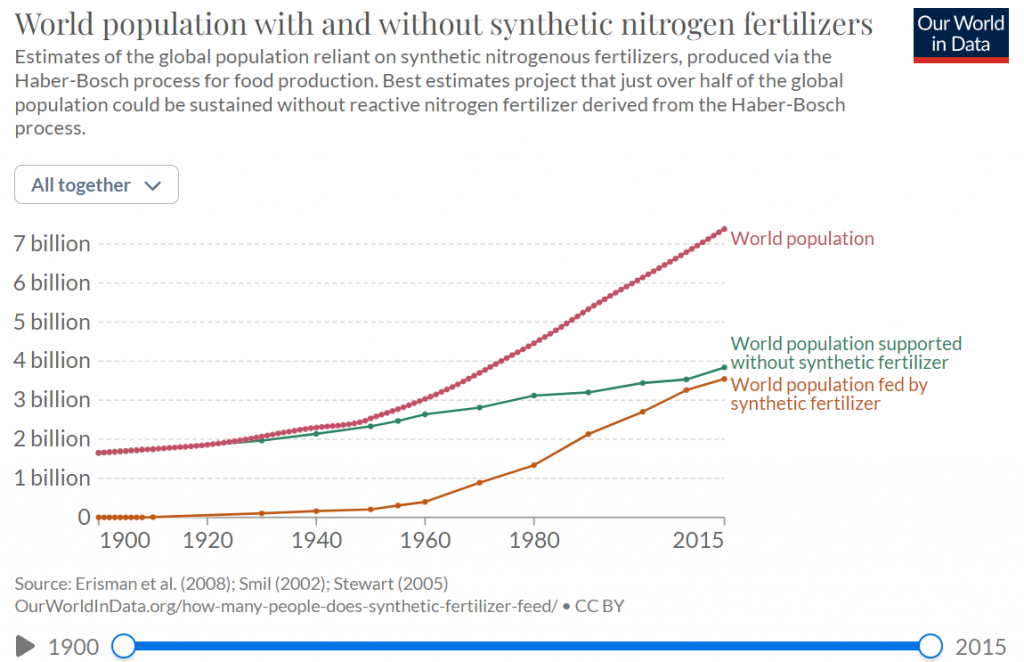Haber-Bosch Process
The initial idea for this blog post came from a YouTube video by Veritasium, choosing this topic will help me with my critical thinking skills regarding ethical dilemmas.

Reflecting on the role of nitrogen-based synthetic fertilizers, their global significance becomes strikingly clear. Both the UK, where I currently live, and Trinidad & Tobago, my family’s homeland, depend on these fertilizers, each using over 100kg per year.

The reason lies in the critical role of nitrogen, the most abundant element in our atmosphere, making up 78% of it. Nitrogen is pivotal in chlorophyll structure, as well as being part of nucleic acid. Yet, until the 20th century, the lack of a practical means to access atmospheric nitrogen for fertilizers meant we had to rely on expensive and unsustainable practices such as the cyanamide process and harvesting bird guano.

The ripple effect of the Haber-Bosch process on human population is profound. It significantly bolstered global food supply by making more nitrogen accessible for plants, Increasing population from 1.6 billion in 1900 to over 7.8 billion today. It’s staggering that nearly half of us owe our existence to this innovation. Bosch was rightly honored with the Nobel Prize in Chemistry in 1918.
(https://ourworldindata.org/how-many-people-does-synthetic-fertilizer-feed/)
(https://www.bbc.co.uk/sounds/play/p04f77rg)
Chemical Warfare

But there’s a darker side to this tale. Haber, the lifesaver, also weaponised his knowledge, causing millions of deaths. A staunch advocate of World War I, he endorsed the “Manifesto of the Ninety-Three”, aligning himself with Germany’s war efforts. Not only did he pioneer the development of chemical weapons, including chlorine gas, but he also supervised its first deployment at the Second Battle of Ypres. He defended his actions, stating,
“The disapproval that the knight had for the man with the firearm is repeated in the soldier who shoots with steel bullets towards the man who confronts him with chemical weapons.”
Fritz Haber, Die Chemie im Kriege fünf Vorträge (1920-1923)
After the Nazis rose to power, Haber (From Jewish heritage) was forced to step down. His institution tragically contributed to the holocaust by creating Zyklon B, the lethal gas that ended 1.1 million Jewish lives.
(https://engines.egr.uh.edu/episode/2287)
Reflection & analysis
Reflecting on Haber’s paradoxical legacy stirs complex ethical questions, to answer these, I took a retrospective look from multiple viewpoints to draw my own conclusion. From a Deontological standpoint, his role in developing fertilizers seems like a commitment to human welfare, yet his involvement in chemical warfare contradicts this. A Consequentialist compares the pros and cons – his fertilizers sustain billions of lives but cause ecological harm due to nitrogen excess, not forgetting the suffering from his chemical weapons & support of the War. A Subjectivist might delve into Haber’s intentions, asking whether he genuinely believed that his weapons could end the war and save German lives.
Taking these reflections further, my personal engagement with the ethics lectures & various sources that scrutinize Haber’s legacy have led me to a mostly deontological viewpoint – Doing a greater good does not excuse unethical practices, therefore we should aim to do the clear moral rights. I’ve found the Haber dilemma to be representative of the wider scientific landscape, where innovations like fertilizers & AI, though beneficial, can have unintended, often detrimental, consequences. His legacy is a testament to the duality of scientific discoveries and reinforces my commitment to tread the path of scientific discovery with due diligence and caution.
This is an initially reflective and well researched blog showing how you have chosen to explore the emerging field of…
This is a good attempt at a blog, where you reflect on your recent learning at a lecture/workshop to describe…
This is a fair to good blog, reflecting on your recent learning in some of your modules. You provide a…
This is an engagingly written and reflective blog focussed in general on ethics in medicine. You might improve by citing…
This is a good and well written an presented blog on an original subject - biofilms on implants. You explain…